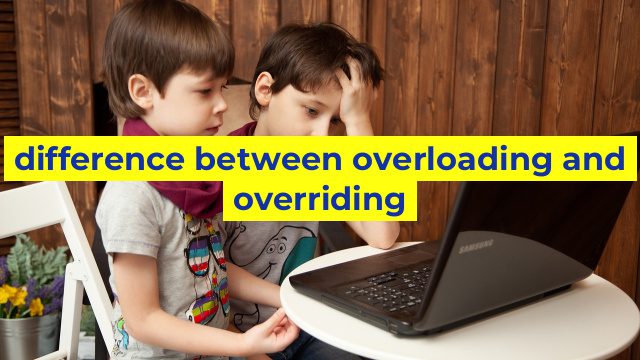Understanding the Difference Between Overloading and Overriding in Programming
When it comes to programming, there are various concepts and terms that developers utilize in order to make the process more effective and efficient. Two concepts that are commonly used in object-oriented programming are overloading and overriding. Although they may sound similar, they are quite different in their functionality and use.
What is Overloading?
Overloading is a feature in programming where a single operator or method is defined with different parameters. In other words, it means creating multiple methods with the same name within a class but with different parameters to perform different tasks. This allows the developers to make their code reusable and easier to read. Overloading can be applied to constructors, operators, and methods.
For example, consider the following method that calculates the sum of two integers:
int sum(int a, int b){
return (a + b);
}
Now, imagine if you want to add three numbers instead of two. Instead of creating a new method with a different name, you can overload the same method by adding a third parameter like this:
int sum(int a, int b, int c){
return (a + b + c);
}
What is Overriding?
Overriding, on the other hand, is a concept where a child class method overrides a method of the parent class. In other words, it changes the implementation of the parent class method in the child class. The child class method will have the same name, argument list, and return type as the parent class method. This feature is useful for implementing runtime polymorphism, which means the same method can be implemented in different ways by different child classes.
For example, consider a parent class named Animal with a method called eat():
class Animal{
void eat(){
System.out.println(“All animals eat to survive.”);
}
}
Now, let’s say we want to define a child class called Dog that inherits from Animal and overrides the eat() method. The child class method would look like this:
class Dog extends Animal{
void eat(){
System.out.println(“Dogs like to eat bones.”);
}
}
When we run the program and call the eat() method, the output will be based on the context of the object called.
Differences Between Overloading and Overriding
Here are some key differences between overloading and overriding:
1. Overloading is related to the quantity and type of arguments, while overriding is related to the method functionality or logic.
2. Overloading occurs within the same class, while overriding occurs in a child class that inherits from a parent class.
3. Overloading provides different ways to call the same method, while overriding enables dynamic polymorphism.
4. Overloading can be performed on constructors and methods, but overriding can only be used with methods.
In conclusion, both overloading and overriding concepts are essential in object-oriented programming. They both allow for a more robust and flexible codebase, but they are used in different contexts. By understanding the difference between overloading and overriding, you will be able to implement these techniques effectively and efficiently in your code.
Table difference between overloading and overriding
| Overloading | Overriding |
|---|---|
| Overloading means defining multiple methods with the same name but different parameters in the same class. | Overriding means defining a method in the child class with the same name and signature as in the parent class. |
| Can happen in the same class or in different classes when they are in a relationship of inheritance. | Can only happen in a relationship of inheritance, i.e. when a subclass extends a parent class. |
| Different methods with the same name but different parameters are called using different arguments. | The overridden method in the parent class is replaced by the method in the child class with the same name and signature. |
| Overloading is a way of providing flexibility to methods by accepting different inputs. | Overriding is a way of modifying the behavior of a parent class method in the subclass. |
